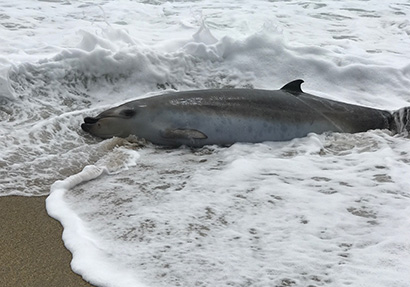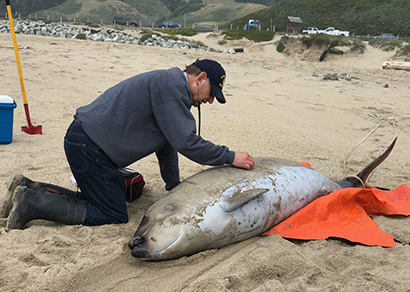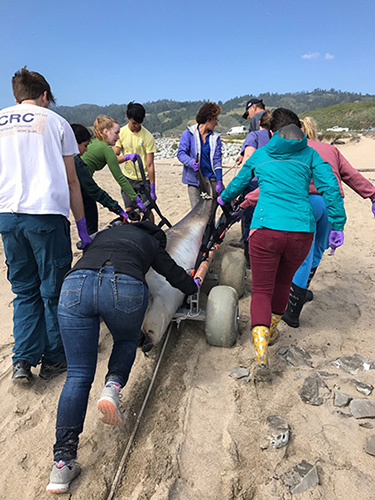Update, June 25, 2019: Genetic testing has determined that the stranded whale is actually a different species, also very rare, called Hubbs' beaked whale. "What is interesting is that adults of this species look nothing like this whale," said UCSC biologist Robin Dunkin. "It turns out that this was a very young animal, probably less than a year old. Once it reaches sexual maturity, it changes color, grows two teeth, and is much bigger than this whale."
Scientists from UC Santa Cruz's Long Marine Laboratory responded to a whale stranding at Scott Creek Beach near Davenport on Friday, May 31, and discovered that the animal was an extremely rare Perrin's beaked whale.
The stranded whale was alive but badly injured and had to be euthanized on the beach. A post-mortem examination (or "necropsy") was performed over the weekend by scientists from UC Santa Cruz and the California Department of Fish and Wildlife (CDFW).
Beaked whales, of which there are 23 known species, are elusive, deep-diving whales that have not been well studied. Perrin's beaked whale was only recognized as a separate species in 2002, and only a few specimens have ever been examined. The one stranded at Scott Creek Beach was a male about about 8.75 feet long and weighed about 500 pounds.
"This is only the seventh individual to have been examined, so it's a rare opportunity. We collected hundreds of samples for researchers here and across the world, and the entire skeleton will be going to the California Academy of Sciences," said Robin Dunkin, teaching professor of ecology and evolutionary biology at UC Santa Cruz and director of the UCSC Long Marine Lab Marine Mammal Stranding Network.
Dunkin and CDFW veterinary pathologist Melissa Miller performed the necropsy with assistance from UCSC and CDFW staff. They found that the whale had a fractured rostrum, the elongated "beak" formed by its jawbones. Both the upper and lower jawbones were broken, but it was not clear how that had happened, Dunkin said.
"We have three hypotheses: The first would be a boat strike, and the second is another animal ramming it. The third possibility is it could have somehow run into the bottom or a rock outcropping while it was pursuing prey," she said. "The pathology samples will help us tell how long ago the injury was sustained."
Beaked whales in general are often involved in mass strandings and appear to be especially sensitive to disturbance by naval sonar. They are the deepest diving marine mammals, regularly descending to depths over 1,000 meters (3,300 feet). They feed on squid and other deep-water prey, using sonar to locate their prey.
Baird's beaked whales, a more common species, have been spotted in Monterey Bay within the past week, Dunkin said, so the team was surprised to discover that the stranded whale belonged to this very rare species. Perrin's beaked whale was described as a new species in 2002 on the basis of five animals that had stranded on the California coast between 1975 and 1997 and were initially identified as other species.
"This really highlights the importance of the marine mammal stranding network in not only responding to the more common strandings of animals like sea lions, but also being there when something rare like this happens," Dunkin said.
Because the beaked whale was alive when it stranded, the team was able to recover very fresh tissue samples, which will be especially useful for researchers. Dunkin said she expects the samples collected from this animal will be used by researchers for decades to come. Scientists are particularly interested in studying the whale's brain and the anatomy of its auditory system, she said.
A team of about a dozen staff, students, and volunteers helped Dunkin and UCSC campus veterinarian David Casper respond to the stranded whale. Casper consulted with rehabilitation experts at the Marine Mammal Center in Sausalito before deciding to euthanize the injured animal. UCSC stranding technicians Karolina Wirga and Amber Diluzio and CDFW laboratory technician Erin Dodd assisted with the recovery and necropsy.
The Long Marine Lab Marine Mammal Stranding Network has been in operation for over 30 years, responding to reports of stranded animals in Santa Cruz County and, in cooperation with Moss Landing Marine Laboratories, in Monterey County as well. The nation's stranding networks, authorized by NOAA to respond to live and dead marine mammals that come ashore on U.S. beaches, make vital contributions to scientific research and conservation of marine mammals. The Long Marine Lab Stranding Network receives funding from NOAA's John H. Prescott Program, which supports stranding networks nationally.





